A Patient’s Perspective | Participating in a Clinical Trial
A Patient’s Perspective | Participating in a Clinical Trial from Patient Empowerment Network on Vimeo.
Colorectal cancer survivor Cindi Terwoord recounts her clinical trial experience and explains why she believes patients should consider trial participation.
Dr. Pauline Funchain is a medical oncologist at the Cleveland Clinic. Dr. Funchain serves as Director of the Melanoma Oncology Program, co-Director of the Comprehensive Melanoma Program, and is also Director of the Genomics Program at the Taussig Cancer Institute of the Cleveland Clinic. Learn more about Dr. Funchain, here.
Cindi Terwoord is a colorectal cancer survivor and patient advocate. Learn more about Cindi, here.
See More from Clinical Trials 101
Related Resources:

|
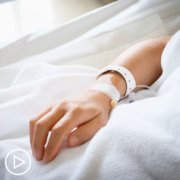
|

|
Transcript:
Katherine Banwell:
Cindi, you were diagnosed with stage IV colorectal cancer, and decided to participate in a clinic trial. Can you tell us about what it was like when you were diagnosed?
Cindi Terwoord:
Yeah. That was in September of 2019, and I had had some problems; bloody diarrhea one evening, and then the next morning the same thing. So, I called my husband at work, I said, “Things aren’t looking right. I think I’d better go to the emergency room.”
And so, we went there, they took blood work – so I think they knew something was going on – and said, “We’re going to keep you for observation.” So, then I knew it must’ve been something bad. And so, two days later, then I had a colonoscopy, and that’s when they found the tumor, and so that was the beginning of my journey.
Katherine Banwell:
Mm-hmm. Had you had a colonoscopy before, or was that your first one?
Cindi Terwoord:
No, I had screenings, I would get screenings. I had heard a lot of bad things about colonoscopies, and complications and that, so I was always very leery of doing that. Shame on me. I go for my other screenings, but I didn’t like to do that one. I have those down pat now, I’m very good at those.
Katherine Banwell:
Yeah, I’m sure you do. So, Cindi, what helped guide your decision to join a clinical trial?
Cindi Terwoord:
Well, I have a friend – it was very interesting.
He was probably one of the first people we told, because he had all sorts of cancer, and he was, I believe, one of the first patients in the nation to take part in this trial. It’s nivolumab (Opdivo), and he’s been on it for about seven years. And he had had various cancers would crop up, but it was keeping him alive.
And so, frankly, I didn’t know I was going to have the option of a trial, but he told me run straight to Cleveland Clinic, it’s one of the best hospitals. So, I took his advice. And the first day the doctor walked in, and then all these people walked in, and I’m like, “Why do I have so many people in here?” Not just a doctor and a nurse. There was like a whole – this is interesting.
And so, then they said, “Well, we have something to offer you. And we have this immunotherapy trial, and you would be one of the first patients to try this.”
Now, when they said first patient, I’m not quite sure if they meant the first colon cancer patient, I’m not sure. But they told me the name of it, and I said, “I’m in. I’m in.” Because I knew my friend had survived all these years, and I thought, “Well, I’ve gotten the worst diagnosis I can have, what do I have to lose?” So, I said, “I’m on board, I’m on board.”
Katherine Banwell:
Mm-hmm. Did you have any hesitations?
Cindi Terwoord:
Nope. No, I’m an optimistic person, and what they assured me was that I could drop out at any time, which I liked that option.
Because I go, “Well, if I’m not feeling well, and it’s not working, I’ll get out.” So, I liked that part of it. I also liked, as Dr. Funchain had said, you go in for more visits. And I like being closely monitored, I felt that was very good.
I’ve always kept very good track of my health. I get my records, I get my office notes from my doctor. I’m one of those people. I probably know the results of blood tests before the doctor does because I’m looking them up. So, I felt very confident in their care. They watched me like a hawk. I kept a diary because they were asking me so many questions.
Katherine Banwell:
Oh, good for you.
Cindi Terwoord:
I’m a transcriptionist, so I just typed out all my notes, and I’d hand it to them.
Katherine Banwell:
That’s a great idea.
Cindi Terwoord:
Here’s how I’m feeling, here’s…And I was very lucky I didn’t have many side effects.
Katherine Banwell:
In your conversations with your doctor, did you weigh the pros and cons about joining a trial? Or had you already made up your mind that yes, indeed, you were going for it?
Cindi Terwoord:
Yeah, I already said, “I’m in, I’m in.” Like I said, it had kept my friend alive for these many years, he’s still on it, and I had no hesitation whatsoever.
I wish more people – I wanted to get out there and talk to every patient in the waiting room and say, “Do it, do it.”
I mean, you can’t start chemotherapy then get in the trial. And if I ever hear of someone that has cancer, I ask them, “Well, were you given the option to get into a trial?” Well, and then some of them had started the chemo before they even thought of that.
Katherine Banwell:
Mm-hmm. So, how are you doing now, Cindi? How are you feeling?
Cindi Terwoord:
Good, good, I’m doing fantastic, thank goodness, and staying healthy. I’m big into herbal supplements, always was, so I keep those up, and I’m exercising. I’m pretty much back to normal –
Katherine Banwell:
Cindi, what advice do you have for patients who may be considering participating in a trial?
Cindi Terwoord:
Do it. Like I said, I don’t see any downside to it. You want to get better as quickly as possible, and this could help accelerate your recovery. And everything Dr. Funchain mentioned, as far as – I really never brought up any questions about whether it would be covered.
And then somewhere along the line, one of the research people said, “Well, anything the trial research group needs done – like the blood draws – that’s not charged to your insurance.” So, that was nice, that was very encouraging, because I think everybody’s afraid your insurance is going to drop you or something.
And then the first day I was in there for treatment, a social worker came in, and they talked to you. “Do you need financial help? We also have art therapy, music therapy,” so that was very helpful. I mean, she came in and said, “I’m a social worker,” and I’m like, “Oh, okay. I didn’t know somebody was coming in here to talk to me.”
But that was all very helpful, and I did get free parking for a few weeks. I mean, sometimes I’d have to remind them. I’d say, “It’s costing me more to park than to get treated.” But, yeah, like I said, I’m a big advocate for it, because you hear so many positive outcomes from immunotherapy trials, and boy, I’d say if you’re a candidate, do it.
Katherine Banwell:
Dr. Funchain, do you have any final thoughts that you’d like to leave the audience with?
Dr. Pauline Funchain:
First, Cindi, I have to say thank you. I say thank you to every clinical trial participant, everybody who participates in the science. Because honestly, whether you give blood, or you try a new drug, I think people don’t understand how many other lives they touch when they do that.
It’s really incredible. Coming into clinic day in and day out, we get to see – I mean, really, even within a year or two years, there are people that we’ve seen on clinical trial that we’re now treating normally, standardly, insurance is paying for it, it’s all standard of care. And those are even the people we can see, and there are so many people we can’t see in other centers all over the world, and people who will go on after us, right?
So, it’s an amazing – I wouldn’t even consider most of the time that it’s a personal sacrifice. There are a couple more visits and things like that, but it is an incredible gift that people do, in terms of getting trials. And then for some of those trials, people have some amazing results.
And so, just the opportunity to have patients get an outcome that wouldn’t have existed without that trial, like Cindi, is incredible, incredible.
What Are the Risks and Benefits of Joining a Clinical Trial?
What Are the Risks and Benefits of Joining a Clinical Trial? from Patient Empowerment Network on Vimeo.
Why should a cancer patient consider a clinical trial? Dr. Pauline Funchain of the Cleveland Clinic explains the advantages of clinical trial participation.
Dr. Pauline Funchain is a medical oncologist at the Cleveland Clinic. Dr. Funchain serves as Director of the Melanoma Oncology Program, co-Director of the Comprehensive Melanoma Program, and is also Director of the Genomics Program at the Taussig Cancer Institute of the Cleveland Clinic. Learn more about Dr. Funchain, here.
See More from Clinical Trials 101
Related Resources:

|

|

|
Transcript:
Katherine Banwell:
Why would a cancer patient consider participating in a clinical trial? What are the benefits?
Dr. Pauline Funchain:
So, I mean, the number one benefit, I think, for everyone, including the cancer patient, is really clinical trials help us help the patient, and help us help future patients, really.
We learn more about what good practices are in the future, what better drugs there are for us, what better regimens there are for us, by doing these trials. And ideally, everyone would participate in a trial, but it’s a very personal decision, so we weigh all the risks and benefits. I think that is the main reason.
I think a couple of other good reasons to consider a trial would be the chance to see a drug that a person might not otherwise have access to. So, a lot of the drugs in clinical trials are brand new, or the way they’re sequenced are brand new. And so, this is a chance to be able to have a body, or a cancer, see something else that wouldn’t otherwise be available.
And I think the last thing – and this is sort of the thing we don’t talk about as much – but really, because clinical trials are designed to be as safe as possible, and because they are new procedures, there’s a lot of safety protocols that are involved with them, which means a lot of eyes are on somebody going through a clinical trial.
Which actually to me means a little bit sort of more love and care from a lot more people. It’s not that the standard of care – there’s plenty of love and care and plenty of people, but this doubles or triples the amount of eyes on a person going through a trial.
Katherine Banwell:
Yeah. When it comes to having a conversation with their doctor, how can a patient best weigh the risks and benefits to determine whether a trial is right for them?
Dr. Pauline Funchain:
Right. So, I think that’s a very personal decision, and that’s something that a person with cancer would be talking to their physician about very carefully to really understand what the risks are for them, what the benefits are for them. Because for everybody, risks and benefits are totally different. So, I think it’s really important to sort of understand the general concept. It’s a new drug, we don’t always know whether it will or will not work. And there tend to be more visits, just because people are under more surveillance in a trial.
So, sort of getting all the subtleties of what those risks and benefits are, I think, are really important.
Katherine Banwell:
Mm-hmm. What are some key questions that patients should ask?
Dr. Pauline Funchain:
Well, I think the first question that any patient should ask is, “Is there a trial for me?” I think that every patient needs to know is that an option. It isn’t an option for everyone. And if it is, I think it’s – everybody wants that Plan A, B, and C, right? You want to know what your Plan A, B, and C are. If one of them includes a trial, and what the order might be for the particular person, in terms of whether a trial is Plan A, B, or C.
What Do You Need To Know About Bladder Cancer?
What Do You Need To Know About Bladder Cancer? from Patient Empowerment Network on Vimeo.
What should you or your loved ones know following a bladder cancer diagnosis? This animated video reviews the diagnosis and types of bladder cancer, current treatment options, and key advice for taking an active role in your care.
See More From The Pro-Active Bladder Cancer Patient Toolkit
Related Programs:

|

|

|
Transcript:
What do you need to know if you or a loved one has been diagnosed with bladder cancer?
Bladder cancer occurs when cells in the urinary bladder grow out of control. As more cancer cells develop, they can form a tumor. And, over time, may spread to other parts of the body.
The most common type of bladder cancer is transitional cell carcinoma or T.C.C.. This may also be referred to as urothelial carcinoma. Other subtypes include: Squamous cell carcinoma, adenocarcinoma, small cell bladder cancer and, sarcomatoid carcinoma.
How bladder cancer is treated depends on the stage. The stages of bladder cancer include: Stage 1, which indicates that the cancer is growing in the inner lining layer of the bladder only. Stage 2 occurs when the cancer is growing into the inner or outer muscle layer of the bladder wall. Stage 3 means that the cancer has grown beyond the muscle layer and into fatty tissue that surrounds the bladder. And, Stage 4 indicates that the cancer is growing outside of the pelvic region and has spread to distant sites, such as the lung, liver, or bones. When cancer has spread to other organs in the body, it is considered metastatic cancer.
When making a treatment choice, your doctor may also consider age, any comorbidities, potential side effects, and the results of biomarker testing, as well as that patient’s preference.
So, what are the treatment options for bladder cancer? For early stage, or non-muscle-invasive, bladder cancer patients, doctors may use a form of immunotherapy instilled in the bladder called B.C.G. which stands for Bacillus Calmette-Guerin. B.C.G. is used to inhibit the cancer’s growth and prevent recurrence.
If patients do not respond or recur after B.C.G., a radical cystectomy – a surgical procedure to remove the bladder, is offered. In select patients, pembrolizumab, a form of immunotherapy, can be used as an alternative.
For localized bladder cancer invading the muscle, treatment is typically chemotherapy, followed by surgery. Tri-modality treatment using chemotherapy along with radiation is an option for patients who are not candidates for surgery – or refuse surgery – and who meet criteria for bladder preservation.
Surgery, including a urostomy where the bladder is removed and replaced with a stoma outside of their bodies, is a major procedure reserved for patients who are very fit with low comorbidities.
Now that you understand a little more about your bladder cancer and treatment options, how can you take an active role in your care?
First, continue to educate yourself about your condition. Ask your doctor for patient resources or visit powerfulpatients.org/bladdercancer for more information.
Understand the goals of your treatment and ask whether a clinical trial might be right for you.
You should also consider a second opinion or consult with a specialist following a diagnosis.
Try to write down your questions before and during your appointments. And bring a friend or loved one to your appointments to help you recall information and to keep track of important details.
Finally, remember that you have a voice in your care. Don’t hesitate to ask questions and to share your concerns. You are your own best advocate.
To learn more about bladder cancer and to access tools for self-advocacy, visit powerfulpatients.org/bladdercancer.
Expert Update: Bladder Cancer Treatment & Research News
Expert Update: Bladder Cancer Treatment & Research News from Patient Empowerment Network on Vimeo.
Dr. Fern Anari reviews highlights from the ASCO 2022 meeting and shares her expert perspective on the future of bladder cancer treatment.
Dr. Fern M. Anari is a genitourinary medical oncologist and assistant professor in the department of hematology/oncology at Fox Chase Cancer Center. Learn more about Dr. Anari, here.
See More From The Pro-Active Bladder Cancer Patient Toolkit
Related Programs:
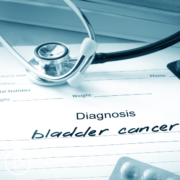
|
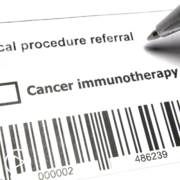
|

|
Transcript:
Katherine Banwell:
Dr. Anari, cancer researchers recently came together for the 2022 ASCO meeting. Were there any highlights from that meeting that bladder cancer patients should know about?
Dr. Anari:
Yes. So, our annual meetings are always a really exciting time to learn about and share the results of really cutting-edge research that’s been going on. And this year at ASCO 2022, I think there were several standout studies for various stages of bladder cancer.
So, in patients with localized bladder cancer, again, similarly to what we discussed with immunotherapy and what we call BCG unresponsive bladder cancer, they looked at combining BCG with another new drug. And what they found is that the cancer shrunk down completely in over two-thirds of cases.
And those responses tend to last over two years of follow-up. The drug was shown to be safe and tolerable. So, I think that’s a really exciting potential future treatment for people. There was another study that looked at a targeted treatment called enfortumab vedotin, which is typically used in the metastatic setting after someone’s received chemotherapy and/or immunotherapy. They looked at using that before surgery in localized muscle-invasive bladder cancer.
The reason it’s important to look at drugs like this is because the standard of care right now is to give cisplatin-based chemotherapy before surgery to remove the bladder.
But not everyone is eligible to get that cisplatin drug for various reasons. So, the current standard of care is to just go straight to surgery. But we know that by giving some form of a chemotherapy before, that helps increase cure rates.
And what they actually found in this study looking at enfortumab vedotin is that they were able to shrink down cancer completely, meaning at the time of surgery there was no cancer left in the bladder 36% of the time, which is actually on par with our standard of care treatment that we use today.
So, I think this also shows a lot of promise in patients who historically would need to go straight to surgery without any preoperative treatment. And then, lastly, HER2 is a type of targeted therapy as well that’s most commonly known in the breast cancer treatment world. But it’s also been looked at in bladder cancer.
And there’s a new drug that’s being studied that really strongly targets HER2, which is expressed on some bladder cancer cells. So, they’re looking at this new drug in combination with immunotherapy, which is already approved in bladder cancer. And, again, I think this is another really promising combination for patients who’ve already received other treatments for their bladder cancer.
Katherine Banwell:
It sounds like a lot of progress is being made in the field. What are you excited about when it comes to bladder cancer research?
Dr. Anari:
I think what excites me the most is being able to offer patients both the standard treatment options where, really, the clinical trials of yesterday are our standard treatments today. So, I’m excited to be able to offer them the standard treatment but also give them the background of why that’s approved and why we use it but also give them the hope that we have these really promising drugs.
And, luckily, at our cancer center, we have access to a lot of these before they’re approved by the FDA. So, it’s really exciting to be able to offer this cutting-edge research in the form of treatments to our patients.
How Does Immunotherapy Treat Bladder Cancer?
How Does Immunotherapy Treat Bladder Cancer? from Patient Empowerment Network on Vimeo.
Dr. Fern Anari from Fox Chase Cancer Center explains immunotherapy and how this therapy works to treat bladder cancer. Dr. Anari also discusses the importance of communicating how you’re feeling with your healthcare team.
Dr. Fern M. Anari is a genitourinary medical oncologist and assistant professor in the Department of Hematology/Oncology at Fox Chase Cancer Center. Learn more about Dr. Anari, here.
See More From The Pro-Active Bladder Cancer Patient Toolkit
Related Programs:

|

|

|
Transcript:
Katherine Banwell:
What is immunotherapy and how does it work to treat bladder cancer?
Dr. Anari:
So, immunotherapy, the analogy that I often use when I see patients is immunotherapy goes in by IV, and it acts as the drill sergeant. And it trains your own body’s immune system or the soldiers to find and fight the cancer cells. So, that’s really how it really works. The drug itself is training your own body to do the work.
Most people will have no side effects from this. And they tolerate it really well. However, because the immune system is getting a little bit activated, sometimes those soldiers or your immune cells can go rogue. And they can start attacking normal healthy tissue in the body, almost like an autoimmune disease.
So, when on these drugs, it’s really important if anything is new or different to let your doctors know, because it’s often easy to troubleshoot over the phone or at a quick office visit if it’s related to immunotherapy or not. So, it’s really important that you keep that in mind whenever a new symptom or anything may pop up.
Katherine Banwell:
That’s great information – it’s really important to communicate any issues you may be having. So, who is immunotherapy right for? Is it right for every bladder cancer patient?
Dr. Anari:
So, immunotherapy is used in several different settings for bladder cancer treatment. It’s used in the metastatic bladder cancer treatment world mostly. Often, we use it as either a second-line treatment after chemotherapy or in a maintenance-type approach after someone’s completed their chemotherapy, meaning we plan for about two years of treatment. And patients that can’t get chemotherapy for whatever reason we can use immunotherapy as a first-line treatment.
And it’s also used in localized bladder cancer meaning cancer that’s contained only to the lining of the bladder in patients who’ve gotten treatments that go inside the bladder called BCG. When their cancer isn’t responding, immunotherapy is also an option there.
Katherine Banwell:
And what might be some of those side effects that patients should look out for?
Dr. Anari:
So, what I tell everyone is they can get inflammation or an “itis” of anything. So, some examples of that: If someone has a rash, that’s called dermatitis. That can be mild, or it can be severe. If someone has inflammation of the bowels or colitis, they can have diarrhea that starts all of a sudden.
Another example is pneumonitis or inflammation of the lungs. People may have cough, trouble breathing, low oxygen levels. It really can affect any organ system that you have. So, that’s why it’s really important if something feels different to let your doctors know.
It’s also really important if you’re not near your doctor for whatever reason and you end up seeing a local doctor, let’s say, at an emergency room that you let them know that you’ve received immunotherapy because they’ll think about the problems that you’re having a little bit differently.
How Does Targeted Therapy Treat Bladder Cancer?
How Does Targeted Therapy Treat Bladder Cancer? from Patient Empowerment Network on Vimeo.
Dr. Fern Anari, a bladder cancer specialist from Fox Chase Cancer Center, explains how targeted therapy works and which type of patient this therapy is most appropriate for.
Dr. Fern M. Anari is a genitourinary medical oncologist and assistant professor in the Department of Hematology/Oncology at Fox Chase Cancer Center. Learn more about Dr. Anari, here.
See More From The Pro-Active Bladder Cancer Patient Toolkit
Related Programs:
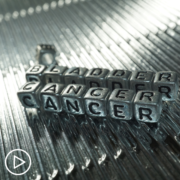
|
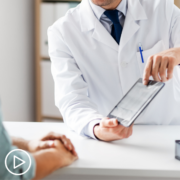
|

|
Transcript:
Katherine Banwell:
What is targeted therapy, and how does it work to treat bladder cancer?
Dr. Anari:
So, targeted therapy is really a newer, more tailored approach to treating certain types of bladder cancer. Targeted treatments because they’re targeted have most of their effect on the cancer cells. Although, obviously, there’s other potential side effects. But the way it works to treat bladder cancer really depends on the different types. There are several different targeted treatments out there.
Often, targeted treatments are approved for people after they’ve gotten chemotherapy and/or immunotherapy for their bladder cancer treatments. There are several different ones out there. Erdafitinib is one of them. It’s a pill. It’s approved for patients who have an FGFR alteration.
Well, what is that? It’s something that your doctor finds by getting the DNA or genetic makeup of your cancer cells. So, those pills are available to people with that certain alteration that’s found on special testing.
With these pills, potential side effects – we talked about how the effects are mostly on the cancer cells. But there are other side effects that we have to keep in mind. This drug in particular can have different eye disorders. So, we work closely with ophthalmologists.
And then we check blood work because people can have high phosphate levels in the blood. Phosphate levels can be controlled often with diet, sometimes with medications, and sometimes with just adjusting the dose of the pill itself.
Katherine Banwell:
You mentioned the FGFR genetic alteration. Should bladder cancer patients undergo molecular testing?
Dr. Anari:
So, the most common place where we do that is when people have metastatic bladder cancer. It’s a good idea to test the biopsy sample or bladder cancer sample that’s already been removed.
That way we get this information. While it doesn’t always change the up-front treatment for bladder cancer, it is really important to know really what tools in our toolbox we have for the treatment of bladder cancer.
Be Empowered in Your Care
Be Empowered in Your Care from Patient Empowerment Network on Vimeo.
When patients are empowered, they feel informed and confident when talking to their healthcare team about their care. Bladder cancer expert Dr. Fern Anari describes how she empowers her patients.
Dr. Fern M. Anari is a genitourinary medical oncologist and assistant professor in the department of hematology/oncology at Fox Chase Cancer Center. Learn more about Dr. Anari, here.
See More From The Pro-Active Bladder Cancer Patient Toolkit
Related Programs:

|

|

The Importance of Patient Self-Advocacy in Bladder Cancer Treatment |
Transcript:
Katherine Banwell:
When patients are empowered, they feel informed and confident when talking to their healthcare team about their care. As an oncologist treating bladder cancer, how do you empower your patients?
Dr. Anari:
There are great online references that will help. Often, doctors will tell their patients not to Google. But that’s not always the right thing. I just think you just have to provide them with the right resources. So, through our cancer center and through many cancer centers, there’s patient advocacy groups. There are support groups. So, those are great places to get information.
There’s also something called the Bladder Cancer Advocacy Network, which has great information for both physicians and for patients and really helps guide people through their journey and give them a little bit more information that then helps guide questions when they do see their doctors.
Why Should Bladder Cancer Patients See a Specialist?
Why Should Bladder Cancer Patients See a Specialist? from Patient Empowerment Network on Vimeo.
Dr. Fern Anari from Fox Chase Cancer Center reviews the benefits of seeing a specialist for a consultation following a bladder cancer diagnosis.
Dr. Fern M. Anari is a genitourinary medical oncologist and assistant professor in the Department of Hematology/Oncology at Fox Chase Cancer Center. Learn more about Dr. Anari, here.
See More From The Pro-Active Bladder Cancer Patient Toolkit
Related Programs:
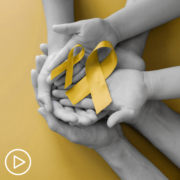
|

|

|
Transcript:
Katherine Banwell:
Why should patients consider seeing a bladder cancer specialist? And how can they find a specialist?
Dr. Anari:
So, I think, always, you can speak with your primary care doctor or your local urologist. They’ll know the bladder cancer specialist in the area. I think it’s important to see a bladder cancer specialist, because the field of oncology is always changing. So, you want to be treated by someone who really is the most up to date on treating bladder cancer.
Bladder cancer specialists may also have access to cutting-edge clinical trials, which you may be interested in. So, it’s nice to know what both the standard options are but also the clinical trial options to see what the best fit is for you.
Katherine Banwell:
What advice do you have for patients that may feel like they are hurting their doctor’s feelings by seeking a second opinion?
Dr. Anari:
So, if my patient is interested in getting a second opinion, I always encourage it. And I actually give them recommendations on people to see. I think very few providers will feel offended or upset by one of their patients requesting a second opinion. At the end of the day, each person’s cancer journey is different. And each person needs to feel comfortable with their own treatment plan.
And by getting a second opinion, they may have treatment options available to them that weren’t otherwise available. So, it’s always nice to know what’s out there.
Key Advice for Newly Diagnosed Bladder Cancer Patients
Key Advice for Newly Diagnosed Bladder Cancer Patients from Patient Empowerment Network on Vimeo.
When you or a loved one has been diagnosed with bladder cancer, it can feel overwhelming. Where do you start? Bladder cancer expert Dr. Fern Anari shares key advice for newly diagnosed patients.
Dr. Fern M. Anari is a genitourinary medical oncologist and assistant professor in the Department of Hematology/Oncology at Fox Chase Cancer Center. Learn more about Dr. Anari, here.
See More From The Pro-Active Bladder Cancer Patient Toolkit
Related Programs:

|

|

|
Transcript:
Katherine Banwell:
Dr. Anari, what are three key pieces of advice that you have for a patient who has just been diagnosed with bladder cancer?
Dr. Anari:
I think probably my number one piece of advice is come to the first oncology appointment with an open mind and an extra set of ears. I think there’s always a lot of information to digest and cover at that first visit. So, it’s always great to have a loved one there to support you and also absorb the information as well.
Probably another piece of advice is to go somewhere where they can provide you with multidisciplinary care. There’s not just one specialist who treats bladder cancer. Often, we work collaboratively between medical oncology, radiation oncology, and urologic oncology.
So, it’s important that the whole team really works together to formulate the right plan for you. And then lastly, it’s really difficult, but stay positive because I think it’s important to know that no matter what you encounter along the way, your doctor is always going to have a plan for you. So, that’s probably the three most important pieces of advice.
Three Ways Bladder Cancer Patients Can Be Their Own Self-Advocates
How can bladder cancer patients become their own self-advocates? In the “The Importance of Self-Advocacy in Bladder Cancer Treatment” program, expert Dr. Shilpa Gupta from Taussig Cancer Institute shares three key ways that bladder cancer patients can take a more active role in their care.
1. Learn When to Speak Up for Yourself
Since bladder cancer patients know their symptoms and treatment side effects best, they are their own best advocates. Make sure to report all your symptoms and treatment side effects – whether you report them at an in-person appointment or online via MyChart messaging or some other electronic method. Communication about how you’re feeling is vital so that treatment adjustments can be made to optimize your quality of life and health outcome. You as a patient should also feel confident to communicate your care expectations to your doctors and to let your care team members if you feel like your questions or concerns are not being heard or no action is being taken in response to them.
2. Know When to Seek a Second Opinion or Specialist
Current bladder cancer care frequently involves a multidisciplinary team that coordinates on care of the patient. Work together with your healthcare team member to determine your treatment goals, treatment options, and ask questions if you want to learn about additional treatment options. After you feel comfortable that you have gathered enough treatment options and second opinions for your care, then discuss your treatment options with your bladder cancer care provider to determine the best treatment plan for you.
3. Seek Out Credible Resources
Bladder cancer patients can take actions to further advocate for your best care. Educate yourself about your condition by reading credible online resources like the Bladder Cancer Advocacy Network, bcan.org. This is a highly recommended resource for bladder cancer patients created by bladder cancer patient advocates – along with the Bladder Cancer Empowerment Center on the Patient Empowerment Network website.
By taking a more active role in your care, bladder cancer patients can help determine the best treatment plan for optimal quality of life and health outcomes.
How Can Clinical Trials Be Accessed?
How Can Clinical Trials Be Accessed? from Patient Empowerment Network on Vimeo.
Clinical researcher Dr. Seth Pollack and patient advocate Sujata Dutta explain the benefits of participating in a clinical trial. They review important questions to ask your doctor and share advice for finding a trial.
Dr. Seth Pollack is Medical Director of the Sarcoma Program at the Robert H. Lurie Comprehensive Cancer Center of Northwestern University and is the Steven T. Rosen, MD, Professor of Cancer Biology and associate professor of Medicine in the Division of Hematology and Oncology at the Feinberg School of Medicine. Learn more about Dr. Pollack, here.
Sujuta Dutta is a myeloma survivor and empowered patient advocate, and serves a Patient Empowerment Network (PEN) board member. Learn more about Sujuta, here.
See More from Clinical Trials 101
Related Resources:
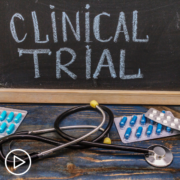
|

|

|
Transcript:
Katherine Banwell:
Sujata, there’s clearly a lot of hesitation and misconceptions out there. What would you say to someone who’s considering a trial but is hesitant?
Sujata Dutta:
I would say speak to your provider, speak to your doctor, and get all these myths kind of busted to say, “it’s going to be expensive” or whatever those questions are. And then, through that process also try and understand what is it that the study is trying to achieve? How is that going to be beneficial to you? So, in my instance, it wasn’t the last line of defense, it was just one of the processes or combos that would help me. And so, that was important for me to understand and then a little bit of education as well. So, I was asking, I have questions on my phone every time I meet my provider, and I did the same thing. So, I think that one of the good practices is keep your note of your questions and have those questions ready. And no question is silly, all questions are important. So, ask as many questions as you can and use that opportunity to educate yourself about it.
And maybe you realize, “No. I don’t think it’s working for me” or “I don’t think this trial is good for me.” But it’s good, important, to have that conversation with your provider, that’s what I would recommend highly.
Katherine Banwell:
Excellent. Thank you, Dr. Pollack, if someone is interested in participating, how can they find out about what trials are even available for them?
Dr. Seth Pollack:
Yeah. I mean, the best thing to do is to start just by asking your doctor if they know about any clinical trials. And a lot of the times the clinical trials are run at the big medical centers that may be closer to you, so you could ask your doctor if there’s any clinical trials at the big medical center even. Or I always think it’s good to get a second opinion, you could go get a second opinion at the big medical center that’s close to you and ask them what clinical trials are at your center.
And sometimes they’ll be conscious about some of the clinical trials that may be even run around the country. And you can ask about that as well.
Katherine Banwell:
Would specialists have more information about clinical trials than say a general practitioner?
Dr. Seth Pollack:
So, I specialize in rare cancers, so a lot of the times the general practitioners they’ve got my cell phone number, and they text me, and they say, “Hey, do you have a clinical trial going on right now?” And that happens all the time, but yeah, the specialists will usually because frankly there’s so much to know. And the general practitioners really have a lot to keep track of with all the different types of diseases that are out there. Whereas at the big centers, the specialists, part of their job is really to keep their tabs on what’s going on with the clinical trials.
So, they’re good people to ask, either your local doctor could reach out to them, or you could go get a second opinion and ask.
Sujata Dutta:
There’s also a lot of information, Katherine, on sites such as LLS, or PEN, or American Cancer Society that they also publish a lot of information. Of course, I would recommend once you have that information then vet it by your specialist, or whatever. But if you’re interested in knowing more about clinical trials in general and some that would work for you, then those are also some places to get information from.
Katherine Banwell:
That’s great information. Thank you, I was going to ask you about that Sujata. Well, before we end the program, Dr. Pollack, I’d like to get your final thoughts. What message do you want to leave the audience with related to clinical trial participation?
Dr. Seth Pollack:
Yeah. I think clinical trials it can be a very rewarding thing for a lot of patients to do, I think patients really like learning about the new treatments. And I think a lot of patients really like being a part of pushing the therapies forward in addition to feeling like sometimes they’re getting a little bit of an extra layer of scrutiny, because there’s a whole extra team of research coordinators that are going through everything.
And getting access to something that isn’t available yet to the general population. So, I think there’s a whole host of advantages of going on clinical trials, but you need to figure out whether or not a clinical trial is right for you.
Katherine Banwell:
Yeah. Sujata, what would you like to add?
Sujata Dutta:
Absolutely, I second everything that Dr. Pollack is saying. And in my personal experience I wouldn’t say everything is hunky-dory, everything is fine. I’m going through treatment, I have chemo every four weeks, I started with chemo every week. That’s when the logistics pace was really difficult because going to Mayo every week was not easy. But anyways, as the trial progress itself every four weeks, but as I said the benefits are huge because I have labs every four weeks. I meet my provider every four weeks.
So, we go through the labs and anything amiss, I’ve had some changes to my dosage because I’ve had some changes in the labs. And so, there’s a lot of scrutiny which I like, but the flip side, for maybe some maybe like, “I have to have chemo every four weeks. Do I want to do that or not?” Or whatever. In my case, I knew it, and I signed up for it, and I’m committed to doing that for two years. And so, I’m fine with that. So, I would say all in all, I’d see more benefits of being in a clinical trial. One, you’re motivated to give back to the community. Two, you are being monitored and so your health is important to your provider just as it is to you. And so, I highly recommend being part of a trial if it works for you and if you’re eligible for one.
Are Clinical Trials Safe?
Are Clinical Trials Safe? from Patient Empowerment Network on Vimeo.
Clinical researcher Dr. Seth Pollack explains the safety protocols in place for clinical trials, including how data is reported and protected. Patient advocate Sujata Dutta goes on to share her experience in a clinical trial.
Dr. Seth Pollack is Medical Director of the Sarcoma Program at the Robert H. Lurie Comprehensive Cancer Center of Northwestern University and is the Steven T. Rosen, MD, Professor of Cancer Biology and associate professor of Medicine in the Division of Hematology and Oncology at the Feinberg School of Medicine. Learn more about Dr. Pollack, here.
Sujuta Dutta is a myeloma survivor and empowered patient advocate, and serves a Patient Empowerment Network (PEN) board member. Learn more about Sujuta, here.
See More from Clinical Trials 101
Related Resources:

|

|

|
Transcript:
Katherine Banwell:
Some patients feel that clinical trials aren’t safe, is that the case, Dr. Pollack?
Dr. Seth Pollack:
No. I mean, we go through, as I was saying before, these clinical trials are extensively vetted. So, the safety is, of course, one of the things that we look most carefully about. But as I was saying before, like with any treatment’s cancer treatments have toxicity, that’s a common problem. So, and when you’re dealing with something brand new sometimes there is a little bit more risk. So, when you’re talking about these very early-stage Phase I trials you probably want to talk to your doctor about what sorts of toxicities you can expect and where they are in the Phase I trial. Are you the first ever to receive this new drug? And if you are nobody’s making you go in the clinical trial, so it can only help to get more information. Right? So, you should ask your team about it, you should find out.
Most of the time there’s going to be a lot of patients that have been treated already, I mean, they can’t give you definitive data about how things are going but they can maybe say, “Hey. I’ve already treated a few patients on it, and they seem to be doing great.”
Katherine Banwell:
So, you need to weigh the pros and cons of the trial.
Dr. Seth Pollack:
You do need to weigh the pros and cons. Now, when you’re talking about these Phase IIs and Phase IIIs, I mean, these are drugs now that have really been vetted for their safety and we have a lot of data about it. And even the Phase Is, it’s not like these things are coming out of nowhere, they’ve been scrutinized, we really expect that they’re going to be safe but we’re doing the trial to prove it. So, it’s a good thing to ask about.
Katherine Banwell:
Yeah, yeah.
Sujata Dutta:
Yeah. I would also add that it’s so closely monitored that safety is a top priority, it’s front and center. So, the advantage, I think, with being on a trial is the close monitoring of the patient exactly for this reason.
If something is amiss it’s going to be picked up as quickly as possible and you’re any issues are going to be addressed as soon as. So, I think, safety does get addressed pretty quickly.
Katherine Banwell:
Good.
Can data from trials even be trusted? Dr. Pollack, is that the case?
Dr. Seth Pollack:
Well, of course, I mean, it can be trusted. Because the thing with the clinical trial data is that you really see the data and there’s all kinds of scrutiny making sure that the data is reported accurately. Now, there’s a whole other conversation we could have as to whether we could interpret the data differently. And sometimes that is an issue that comes up, but the data is reported very accurately.
So, and there are statistics that are very well understood, and the bar is actually pretty high to say one arm of the trial was better than the other arm of the trial. So, if patients have better survival on one arm, if we say that, usually it means they did considerably better. Enough better that it wasn’t a random chance that one extra patient did better on the treatment arm. No. There were enough patients that did better that the statisticians can go through it with a fine-toothed comb. And they can be absolutely sure up to exactly how many percent sure they can tell you, 0.05 percent or less chance of error that this was a real difference between the study arm and the standard of care arm.
Sujata Dutta:
I think you mentioned too that one is trust, and one is data. So, Dr. Pollack mentioned a lot about the data, I think the trust is also a very important thing. I like to go with positive intent because I do not have a reason to believe my doctor has some ulterior motive to suggest a clinical trial. And so, I trust them wholeheartedly. The first hurdle is you have to trust the system or what is being proposed to you because, as Dr. Pollack said, it’s gone through a lot of vetting. A recommendation to be part of a trial itself is vetted by your doctor when they make the recommendation. So, have faith, trust, that they are making a good recommendation. And then, of course, the data, I don’t know much about that, but as I said, I trust it. So, I would trust the data too.
Katherine Banwell:
Of course. Of course. Some patients feel like they’re going to lose their privacy. Sujata, did you feel that at all?
Sujata Dutta:
No. Not at all.
I mean, with everything else that is also taken care of, my information, or whatever, is not made available to anybody. And so, obviously there’s a lot of people will get those, and I had a huge pile of paperwork to go through, but I think that’s a good thing. For my peace of mind that I knew that my information was not going to be shared outside of the study, the trial, etc., and things. So, no, I don’t think that’s a problem.
Katherine Banwell:
Beyond these misconceptions is there anything else you hear? Dr. Pollack?
Dr. Seth Pollack:
No. I mean, look, in our crazy modern world there’s concerns everywhere, but the clinical trial is very, very careful. Whenever possible we use the medical chart.
And then, we have a very stringently protected database that’s storing people’s information, but it’s deidentified. So, I mean, we have a separate key to figure out who the patients are and then we try to limit the use of the patient’s name or any identifying information about them beyond that. So, and your information is not shared. For example, if there’s a drug company involved in the trial, your information is not shared with the drug company, you have a new identifier that is unique and not traceable back to you that is provided to whoever, if there’s outside groups working on the trial with you. So, your information is very carefully protected, and everyone is very conscious about issues regarding privacy.
Katherine Banwell:
That’s great to know.
Are Clinical Trials a Logistical Nightmare?
Are Clinical Trials a Logistical Nightmare? from Patient Empowerment Network on Vimeo.
PEN board member and myeloma survivor Sujata Dutta shares how her family managed the logistics of her clinical trial participation.
Sujuta Dutta is a myeloma survivor and empowered patient advocate, and serves a Patient Empowerment Network (PEN) board member. Learn more about Sujuta, here.
See More from Clinical Trials 101
Related Resources:

|

|

|
Transcript:
Katherine Banwell:
The logistics will be a nightmare and I don’t live close to a research hospital. Sujata, did you have that issue?
Sujata Dutta:
Yeah. That’s a very interesting one, and actually I’ll share my experience. I did have this concern about logistics, because I got my transplant at Mayo Rochester, which is a two-hour drive from where I live. And so, when I got to know about it literally me and my husband were like, “Oh, my gosh. What are we going to do?” It’s not just me, my husband is my caregiver, he has to take the day off to drive me to Mayo, wait through my treatment, and drive me back. Then we have boys who were distance learning at the time, and so what do we do with them? Do we drop off a friends or take a favor from a friend? And so on and so forth.
So, the logistics was an issue and we literally said, “Thanks but no thanks” and we walked out of the room. And we came downstairs, and my husband was like, “What the heck?” My team understands everything, and I fortunately work for a very good employer, and they understand everything, people first. And so, he was like, “I can figure this out. Let’s do it if this is what’s going to help you, then let’s just figure this out.” And at that time, it was so good, and I have total respect for Dr. Pollack.
You and everybody in this medical community. My doctor who leads the trial at Mayo, she actually said, “Why don’t you check with your local cancer center? Maybe they are also approved by FDA, and they may be able to administer this treatment to you.” Unfortunately, at that time they weren’t but we were like, “We’re going to go ahead with the trial. It doesn’t matter.” My husband was like, “I’ll take the day off, you don’t worry about it.” And then, four months later my institute did get approved by FDA, and so I was able to transfer from Mayo to my local cancer center, Abramson Cancer Center, which is 20 minutes from home. And so, there are options, I know that it can be an issue and it can be overwhelming at the time which was the case with me. But I was able to overcome that, so maybe there are options available that the patients can consider.



